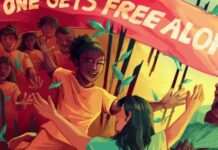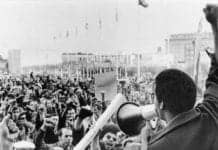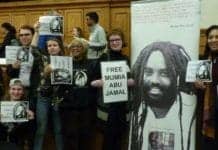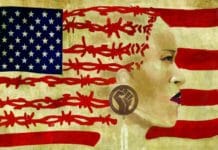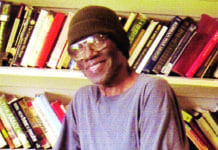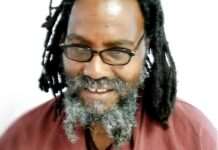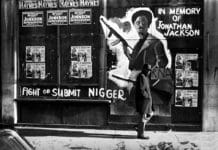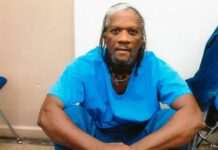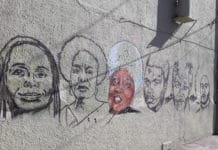June 25 update: Instead of negotiating with supporters who are prepared to buy back Marcus Books from the Sweis family, the Sweises are pressuring the judge to evict the book store and the family who own it and live upstairs. So we need to turn up the heat on the Sweises by BOYCOTTING their taxicab businesses, Big Dog City and Royal Cab companies. On Tuesday, July 2, 3 p.m., the community will caravan to the Sweis family home in South City for a PROTEST RALLY at 4 p.m. Spread the word about the BOYCOTT and RALLY!
June 23 update: Marcus Books was packed on Saturday with a community united and as committed as Archbishop King to “REFUSING to let Marcus Books close.” Another organizing meeting will be held on Monday, June 24, 3 p.m., at the store, 1712 Fillmore St.
Video by Ken Johnson
June 21 update from attorney Julian Davis: On Saturday, June 22, at 12:30 p.m., supporters, community members and community organizations will hold a press conference, rally and letter writing campaign to save Marcus Books.
The bookstore continues to be open.
Recently, a group of supporters and the Alliance of Californians for Community Empowerment (ACCE) have begun an organizing campaign to urge Nishan and Suhaila Sweis, who recently bought the property at a bankruptcy sale, to be “community heroes” by accepting the offer from the Johnsons, proprietors of Marcus Books, and Westside Community Services to repurchase the property.
“Marcus Books is a historical, educational, culture institution,” says Archbishop Franzo King of the St. John Coltrane Church. “To rob a people of the written word of the Black community is to be committed to the total destruction of that community. We have seen enough of our long time businesses and community members be displaced. As a community, we are taking a stand against that destruction and REFUSING to let Marcus Books close.”
“As a community, we are … REFUSING to let Marcus Books close.” – Archbishop Franzo King
In addition to emails and calls from members of ACCE, a petition at change.org and media coverage here, at colorofchange.org and elsewhere, ACCE and supporters of Marcus Books recently held a demonstration at St. Nicholas Church, where Nishan and Suhaila Sweis, are deacon and subdeacon. Supporters attended mass holding signs stating “Pray the Sweises do the right thing: SAVE MARCUS BOOKS.” Several parishioners were surprised and supportive of the demonstration and committed to talk to the Sweises.
“We’ve been sending emails, making phones calls, asking elected officials to weigh in. We want the Sweises to know how much Marcus Bookstore means to San Francisco,” says Ed Donaldson, ACCE member and housing activist who has led local fights to keep foreclosed families in their homes. “So far, we haven’t heard much from the Sweises. We’re determined to keep Marcus Bookstore open and where it is.”
Supporters are organizing a community letter writing campaign immediately after the press conference and hope to gather 1,000 letters to deliver to the Sweises.
“Marcus Book Store is just one of many examples of how long time residents, businesses, neighborhoods are being displaced or gentrified,” says Ed Donaldson. “If the city and the community don’t stand up to investors, banks, businesses that have no interest in preserving the residents that helped build this city, then San Francisco will lose the diversity it’s known for and the working and middle class families who keep this city running.”
by Malaika H Kambon

Marcus Book Store, Garvey’s namesake, at 1712 Fillmore St., San Francisco, in the Fillmore District once known as Harlem of the West, is packed with that knowledge and has purveyed it since 1960, for 53 years. Housed in the landmark Bop City building that once hosted all the jazz greats, the oldest Black book store in the country has been ordered out – evicted – this coming Tuesday, June 18.
After a standing-room-only press conference at the store on June 10, a plan of action to save Marcus Books, conceived by Archbishop Franzo King, is set for tomorrow, Sunday, June 16. Supporters will attend a church service to pray that speculators who purchased the building will sell it to a non-profit investment group at a small profit so that the bookstore can remain open.
At 10:30 a.m., Marcus Books supporters will hold a press conference at the entrance to Christopher Playground at Diamond Heights Boulevard and Duncan Street in San Francisco and then proceed to St. Nicholas Church, 5200 Diamond Heights Blvd, where the recent buyer at a bankruptcy sale, Nishan Sweis, is a subdeacon. Nishan and his wife Suhaila are also real estate investors specializing in buying distressed properties and the owners of a taxicab company, according to the Examiner.
Archbishop King, who works with the Alliance of Californians for Community Empowerment (ACCE) to stop foreclosures and evictions and who pastors the internationally acclaimed St. John Coltrane Church, declared: “This Afrikan-American community has been preyed upon by what we call ‘banksters.’ … If we do nothing, we will be nothing.

“There is an assault on this community,” Rev. Arnold Townsend of the Equal Opportunity Council of San Francisco told the press June 10. “All of everything that we’ve talked about today as it relates to the Afrikan American community – urban renewal, the foreclosure crisis – it’s just a question of the transfer of wealth. When you see this building taken out of the hands of Afrikan Americans and put in the hands of some others, once again, it’s a transfer of wealth.
“And the wealth that has been taken out of Afrikan Americans’ hands, no one is speaking out against it, outside of the Afrikan American community – and that means that you’re complicit!” he said to the general public, as news cameras rolled and reporters noted his words.
Backing up his charge of complicity, he quoted Albert Einstein, who served as president of the Anti-Lynching Society, decrying the “attitude of Whites toward their fellow citizens of darker complexion. … I can avoid the feeling of complicity in it only by speaking out.” “And so,” Rev. Townsend concluded, “it is time for the city to speak out against racism as it pertains to African Americans.”
Rev. Townsend concluded, “It is time for the city to speak out against racism as it pertains to African Americans.”
Julian Davis, attorney for the Johnson family, summed up the situation at the end of the press conference: “Where we stand right now is that Westside Community Services has made an offer to repurchase the property from the Sweis family that purchased it less than two months ago after a bankruptcy court proceeding (after Marcus Books missed) a court imposed deadline. Now they have the resources available, through Westside Community Services, to be able to purchase the property and remain here and continue to operate this fantastic institution that means so much to so many people in this community.

“So we’re appealing not only to the compassion of the Sweis family but to their business sense as well. This is a solution that makes them whole and then some, and keeps Marcus Books here at its historic site.
“The Sweis family has not responded to the offer of $1.64 million. As Dr. Mary Ann Jones, the chief executive officer of Westside said, they put out a number of $3.2 million, which she found to be unconscionable and which might not be in the best faith in terms of real negotiations. They’d asked us for a number and we’ve given them a very good number that we’re hoping that they will consider more seriously.
“June 18 is a deadline for the Johnson family to vacate the property. I know that the Johnsons are working with a number of people including the mayor’s office of redevelopment to find an alternate location for the book store in the neighborhood. There are some tenants upstairs who aren’t under the stipulation to vacate – for instance, some of the Johnson family members, such as their daughter who has a lease here.
“So I think you have a situation pending on the 18th that I think the Johnsons want to make clear does not spell the end of Marcus Book Stores. It may eventually mean that Marcus Book Store is no longer here at this great location at 1712 Fillmore St., but they will always be a part of the neighborhood, and they will be in the neighborhood at another location if that’s what it comes to. We’re all hoping it doesn’t.”
“There are a number of folks who plan to reach out to the Sweis family to request their cooperation,” attorney Davis concluded.
“We’re appealing not only to the compassion of the Sweis family but to their business sense as well. This is a solution that makes them whole and then some, and keeps Marcus Books here at its historic site,” said attorney Julian Davis.
“The Sweises might end up the heroes of the story,” the Examiner quoted Marcus Books proprietor Gregory Johnson saying at the press conference. Then “everyone wins,” said his wife Karen Johnson, daughter of Marcus Books founders Drs. Raye and Julian Richardson. “It sounds good to me.”

Freedom needs knowledge
In his book, “Christopher Columbus and the Afrikan Holocaust: Slavery and the Rise of European Capitalism,” Ancestor Dr. John Henrik Clarke states: “Before the breaking up of the social structure of the Afrikan states such as Ghana and Songhai, and the internal strife that made the slave trade possible, many Africans, especially West Africans, lived in a society in which university life was fairly common and scholars were held in reverence.
“In that period in African history, the University of Sankore at Timbuktu was flourishing and its great chancellor, the last of the monumental scholars of West Africa, Ahmed Baba, reigned over that university. A great African scholar, he wrote 47 books, each on a separate subject. He received all of his education within Africa; in fact he did not leave the Western Sudan until he was exiled to Morocco during the invasion in 1594.
“My point is this: There existed in Africa prior to the beginning of the slave trade a cultural way of life that in many ways was equal, if not superior, to many of the cultures then existing in Europe. And the slave trade destroyed these cultures and created a dilemma that the African has not been able to extract himself from to this day” (Page 82 in print, 42 online).
“We did not consider the fact that for most of the time Afrikan people have been on the Earth, they have been free people, determining their own destiny, and they have not been slaves,” said the late Dr. Clarke.
“(F)or most of the time Afrikan people have been on the Earth, they have been free people, determining their own destiny, and they have not been slaves,” said Dr. John Henrik Clarke.
During the enslavement of Afrikan people, every attempt was made to destroy the Afrikan memory of ever having been a part of a free and intelligent people.
Marcus Books, purveyor of knowledge and freedom
But Drs. Raye and the late Julian Richardson established a dynasty that in over half a century has gone a long way toward counteracting this dangerous misconception.
At age 15, Dr. Raye Gilbert Richardson graduated from high school. Forty-five years later, in 1960, four years prior to the year known as the Year of the Ballot or the Bullet, Drs. Raye and Julian Richardson co-founded in San Francisco the first of the internationally renowned Marcus Book Stores, named for Marcus Garvey. In 1976 a second store was founded in Oakland.

Archbishop King captured the classlessness of Marcus Books when he said at the June 10 press conference: “We don’t want to lose this building and we don’t want to lose this fight. And we’re not just speaking for intellectuals; we’re speaking to the thugs too. Thugs need this place. Or else they will be thugs for the rest of their lives.”
Both stores have hosted televised interviews with jazz greats, outstanding entrepreneurs, scholars, political activists and former political prisoners. Black Panther Party meetings were held at Marcus Books as were the meetings when the Black students at San Francisco State University went on strike in 1968. The San Francisco 8 were interviewed there by Lance Burton in the midst of their fight for freedom.
And on June 17, 2013, Dr. Raye Richardson will celebrate her 93rd birthday.
Drs. Raye and Julian Richardson’s daughter Blanche Richardson said, when asked about the Marcus Book Stores’ intersection with the Civil Rights Movement: “Marcus Books was a part of the Civil Rights Movement. Marcus Books provided a forum for many Civil Rights and Black Power organizations. We also hosted many authors who were writing about the political scene at the time. When the Black students at San Francisco State University went on strike, our home was put up as collateral to get them out of jail. My parents were frequent speakers at various political events. Marcus Books initiated dozens of forums and seminars on race relationships and the politics of Blackness. Our family – sometimes just our family – picketed every place there was to picket: hotels, car dealerships, retail businesses, housing developments.”
And when asked about her favorite events that have taken place, she replied: “All events are great that happen at Marcus Books because they are instructive, informative, exciting and positive. (Nutritious too, if we serve food!)”
“Marcus Books was a part of the Civil Rights Movement. … When the Black students at San Francisco State University went on strike, our home was put up as collateral to get them out of jail. My parents were frequent speakers at various political events. Marcus Books initiated dozens of forums and seminars on race relationships and the politics of Blackness. Our family – sometimes just our family – picketed every place there was to picket: hotels, car dealerships, retail businesses, housing developments,” Blanche Richardson said.
When asked how Marcus Books survives among chain bookstores and online bookstores like Amazon, her response was, “Marginally! That we survived is a testament to some very dedicated customers who appreciate the value, the warmth, the camaraderie established by Marcus Book Stores. It has to be very rewarding for a Black person to walk into a business establishment and not be subjected to preconceived notions that he or she is a thief.”
The Marcus Book Store dynasty started as Success Printing in the Fillmore District when the Richardsons, avid readers, discovered that books by, for and about Black people everywhere were difficult to purchase and harder to find. They began to publish popular works by Black authors and poets, as well as out of print literature they deemed to be essential reading. When racism and redevelopment began pushing Afrikan people out of San Francisco and gutting the once vibrant Fillmore District, they opened their second book store in Oakland in 1976.
Through redevelopment, bulldozers, racism and a retail giant, Amazon, that undercut prices for small book stores by offering the same books for cheaper prices online, Marcus Book Stores have kept their doors open by providing what their Afrikan community needed most: a progressive avenue of information about ourselves, our own bookstore, a way of being FUBU – for us, by us.
Black businesses under attack, yesterday and today
And now, in 2013, the ugly monster of racism in San Francisco is coming again to try and steal what is ours – our land and our Marcus Books, in an effort to derail our historic place and pretend that we as Afrikan people do not exist in any way but that which is warped and underdeveloped in their colonized mentalities.
But why does this keep happening to us? The insights of El Hajj Malik El Shabazz, Malcolm X, provide some of the answers.

On April 12, 1964, Malcolm X delivered his famous “The Ballot or the Bullet” speech in Detroit, Michigan. He addressed brothers and sisters, moderators, religious and spiritual leaders – and friends and enemies. He stated, in fact, “We would be fooling ourselves if we had an audience this large and didn’t realize that there would be some enemies present.”
He pointed out several Christian ministers who came to be known more so for their political struggles on behalf of the Afrikan community: Rev. Dr. Martin Luther King Jr., Rev. Adam Clayton Powell of Harlem’s Abyssinian Baptist Church and a longtime member of Congress, Rev. Milton Galamison, who fought against Brooklyn’s segregated school system, and Rev. Henry Cleage, from Detroit, Michigan, who headed the Freedom Now Party.
Malcolm was a Muslim minister who stressed that unity between different religions could be achieved when we “keep our religion between ourselves and our God. When we come out here, we have a fight that’s common to all of us against an enemy who is common to all of us.”
And he didn’t believe in fighting in any one front, but on all fronts. In fact, he described himself as a “Black Nationalist Freedom Fighter,” whose political, social and economic philosophy was Black Nationalism.
He stated: “The political philosophy of Black Nationalism means that Black people must control the politics and the politicians of their communities. We must know what politics are supposed to produce in our communities. We must know what part politics play in our lives. And until we become politically mature, we will always be misled, led astray or deceived or maneuvered into supporting someone politically who doesn’t have the good of our community at heart.”

Echoing Malcolm’s words, from a deep well of Afrikan wisdom, the Ujamaa Network reminds us, “We must buy from ourselves in order to re-circulate Black dollars. If we want our dollars to return, we must spend them within our own community. (This) will be our year if we decide it will be. Make a commitment to yourself to do as much of your spending within our community as possible.”
But isn’t that what Marcus Book Stores do? Providing a means for the Afrikan community worldwide to buy from ourselves – including from behind the walls of the U.S. government’s 21st century slavocracy, the prison industrial complex? Isn’t that what Marcus Book Stores prove? What we could do not only in the present and in the future, but what we have done since the Afrikan origins of humanity?
And aren’t the attacks on the Afrikan community the same game with different rules? It seems so. The lynching rope just isn’t always made of hemp in the 21st century.
Malcolm stated: “The political philosophy of Black Nationalism means that Black people must control the politics and the politicians of their communities.”
It’s sometimes made of predatory lending, foreclosures, gentrification, balloon payments and court dates slanted in favor of those who would shift the Afrikan community’s wealth out of our hands into the hands of others. Malcolm was right. The Richardson-Johnson family is right. The philosophy of Marcus Book Stores is right.
And the history of Afrikan people having our land and our wealth and businesses stolen from us in spite of all that we can do is wrong.
This history becomes particularly important when one considers the reasons behind the chilling destruction of the prosperous, self-sufficient Afrikan towns of Rosewood, Florida, in January 1923 and Black Wall Street in Tulsa, Oklahoma, on June 1, 1921.

“Black Wall Street, the name fittingly given to one of the most affluent all-Black communities in America, was bombed from the air and burned to the ground by mobs of envious Whites. In a period spanning fewer than 12 hours, a once thriving Black business district in northern Tulsa lay smoldering – a model community destroyed and a major African-American economic movement resoundingly defused.
“The night’s carnage (on Black Wall Street) left some 3,000 Afrikan Americans dead and over 600 successful (Black-owned) businesses lost. Among these were 21 churches, 21 restaurants, 30 grocery stores and two movie theaters, plus a hospital, a bank, a post office, libraries, schools, law offices, a half dozen private airplanes and even a bus system.”
“The night’s carnage left some 3,000 Afrikan Americans dead and over 600 successful businesses lost. Among these were 21 churches, 21 restaurants, 30 grocery stores and two movie theaters, plus a hospital, a bank, a post office, libraries, schools, law offices, a half dozen private airplanes and even a bus system. As could have been expected, the impetus behind it all was the infamous Ku Klux Klan, working in consort with ranking city officials and many other sympathizers.”
Community leaders join effort to save Marcus Books
Now, in 2013, the Afrikan fight is against a different – but no less racist – assault upon the Black community, against its internationally famous Marcus Book Stores, most particularly the store located in the Fillmore District, one of the few remaining “Black Belt” communities in San Francisco.
The book stores are self-sufficient and provide a service to a global Afrikan community. They are being run by three generations of a well-known and well-respected Afrikan family.

At the press conference June 10, the Rev. Dr. Amos Brown, San Francisco NAACP president, spoke of the importance of Afrikan people having a place in San Francisco and quoted Archimedes saying, “Give me a place to stand and I will move the world.” He stressed the importance of “putting the crisis at Marcus Books in historical perspective.”
He compared the complicity of those who would redevelop Afrikan people out of their rightful place in San Francisco to the Northern forces in the Civil War who “promoted, prolonged and profited from” the enslavement of Afrikan people.
“I stand in solidarity with my fellow speakers in asking the Sweis family to please sell the building back to us as a community, so that we can preserve it as a cultural institution,” said Ed Donaldson of the Home Defenders’ League. “When folks begin to attack our cultural institutions, they attack our very existence, and we cannot tolerate it. We have to stand up and fight.”
Framing the issue in the larger context of San Francisco, he explained: “There have been over 4,000 homes that have been foreclosed in San Francisco in the last five years, many in communities of color. There are no funds being allocated for single-family homes to be rescued. The city of San Francisco, on the heels of the passage of Proposition C, is now having a conversation around the allocation of $15 million, and the Afrikan community has not been at the table. I call upon the Mayor’s Office of Housing and the City of San Francisco to correct that.”
“When folks begin to attack our cultural institutions, they attack our very existence, and we cannot tolerate it. We have to stand up and fight,” said Ed Donaldson of the Home Defenders’ League.
The crowd hushed to hear Marcus Books proprietors Greg and Karen Johnson; even the traffic outside the door seemed to make less noise. Greg said: “We’d like to voice our appreciation for the entire group and the overwhelming support that we’ve received from every direction. This business is not based upon capitalism. It is based upon the importance of integrity and on the importance of betterment for the community at large. We’re not here to subsidize ourselves. We’re here to grow the community. We want that to be known. This is not a war. We are not at war with the Sweis family. There’s no intention. We are at peace. But we want social justice. And we won’t be denied social justice. That’s all we ask at this particular time.”
Karen was as usual very soft spoken. But her words – again as usual – carried power. She said: “Change has its own vitality and its own reality. So I think this represents change that has come, and we’re all affected and riding the wave of it and it looks really good.

“So we’re here to nurture the Black part of all of us. I’ve been touched by this place. I’m just the little clerk in this bridge where people come in to dip from the lake of Black wisdom. I love being here, too and it’s nice to see other people who have sipped from the same well. Hopefully it’s going to grow from the sea, and there will be more of us. Thank you for your support.”
How you can help
Help save Marcus Book Store by
- attending the press conference and church service tomorrow, Sunday, June 16: Gather at Christopher Playground at Diamond Heights Boulevard and Duncan Street, San Francisco, at 10:30 a.m., then proceed to St. Nicholas Church, 5200 Diamond Heights Blvd;
- signing the petition at Change.org; and
- joining hundreds of supporters for a meeting on Monday, June 17, 3 p.m., at Marcus Books, 1712 Fillmore St., San Francisco.
Fight back for what is ours.
A sampling of the countless cultural and community events held at Marcus Book Stores
Marcus Books – Bop City Moment, Earle Davis: Musician Earle Davis talks about his musical experiences and plays his “Funk for Monk.”
Marcus Books – SF 8 Visit Part 1, Part 2, Part 3 and Part 4: Lance Burton interviews the San Francisco 8 at Marcus Book Store in San Francisco.
Marcus Books – Bob Livingstone, Healing: Kevin Washington, Ph.D., of the Africana Studies Department at San Francisco State University interviews Bob Livingstone about his book, “The Mind Body and Soul Solution: Healing Emotional Pain Through Exercise.”
Marcus Books – Ephren W. Taylor II – Part 1: Ephren W. Taylor II, CEO of City Capital Corp., is the youngest African-American CEO of any publicly traded company. He started his first business venture at age 12 and built a multi-million dollar national company by age 17. His concepts on empowering local communities with socially conscious investing and development earned him the distinguished 2002 Kansas Young Entrepreneur of the Year Award.
Marcus Books – Dr. Brenda Wade & company – Part 2: Authors discuss Black love at Marcus Books – healing in the light of the Maafa – with interviewer Kevin Washington, Ph.D.
Malaika H Kambon is a freelance photojournalist and the 2011 winner of the Bay Area Black Journalists Association Luci S. Williams Houston Scholarship in Photojournalism. She also won the AAU state and national championship in Tae Kwon Do from 2007-2010. She can be reached at kambonrb@pacbell.net.
“Audioform Live at Marcus Books, San Francisco, ’07,” a jazz festival right outside the doors of Marcus Books

 Store
Store



